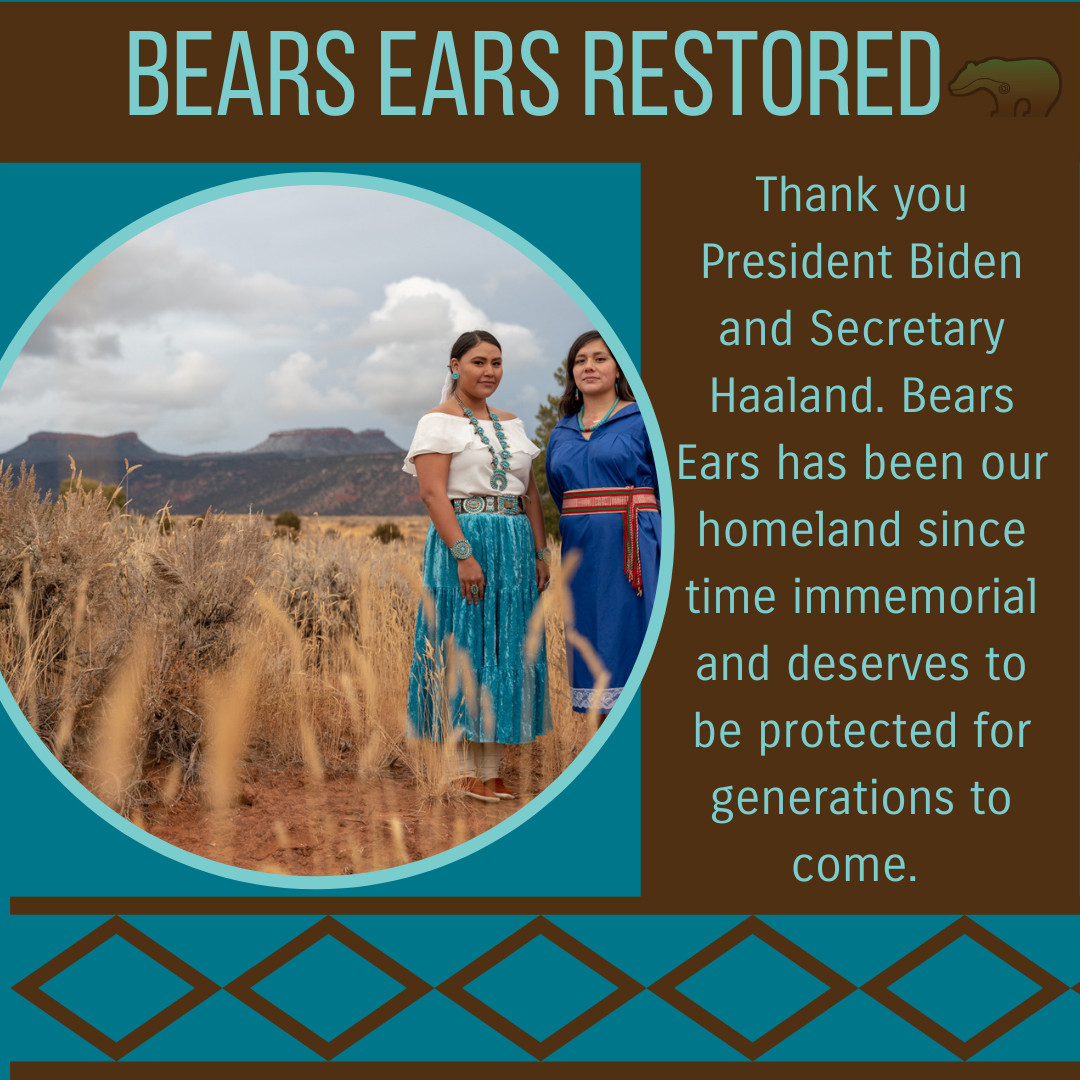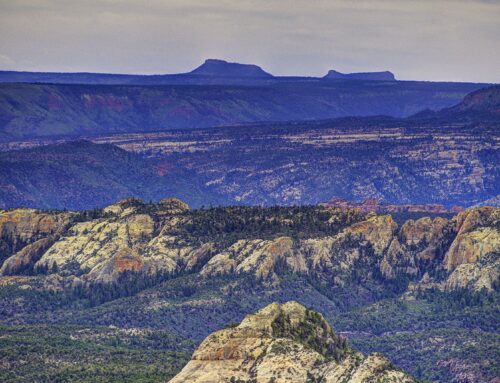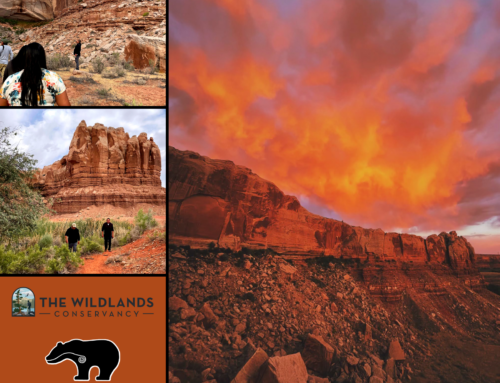The decision restored full protections to Bears Ears and Grand Staircase-Escalante in Utah and reinstated fishing restrictions in a marine monument off New England
By Joshua Partlow
October 8, 2021 at 3:43 p.m. EDT
Biden used an executive order to protect 1.36 million acres in Bears Ears — slightly larger than the original boundary that President Barack Obama established in 2016 — while also restoring the 1.87 million-acre Grand Staircase-Escalante monument. Biden also reimposed fishing restrictions in the Northeast Canyons and Seamounts Marine National Monument in the Atlantic Ocean off the coast of New England that Trump had opened to commercial fishing.
Biden signed the proclamations in a ceremony outside the White House, in front of tribal leaders and others. He used his authority under the 1906 Antiquities Act.
“This may be the easiest thing I’ve ever done so far as president,” Biden said before the signing.
“Protection of public lands must not become a pendulum that swings back and forth depending on who’s in public office. It’s not a partisan issue,” he added. “National monuments and parks are part of our identity as a people. They are more than natural wonders. They are the birthright we pass from generation to generation. A birthright of every American.”
Biden had campaigned on reversing Trump’s rollbacks to Bears Ears and other monuments, but tribal activists and conservationists had grown increasingly frustrated in recent months that he had not acted. The Washington Post reported in June that Interior Secretary Deb Haaland recommended to the White House that Biden restore protections to the monuments.
On Friday, Pat Gonzales-Rodgers, the coalition’s executive director, said that “we’re incredibly grateful to the administration.”
“I think they’re doing right by the tribes but also they’re doing right by the American public, and after all, this is public land,” he said.
Biden administration officials described the monument restoration as part of a larger effort to protect ecosystems as a way to fight climate change and the impacts of extreme weather.
“We strengthen the power of our soils, our grasses, and our trees to trap carbon pollution,” said Gina McCarthy, the White House national climate adviser. “And healthy natural systems build up our resilience against the climate impacts that we know we are already facing.”
In Bears Ears — named for the twin buttes that rise above the landscape — tourists and looters routinely steal ceramic shards, arrow heads and other remnants of the settlements of the Ancestral Pueblo Indians who lived in the area. Some of the ancient rock art has been defaced. A surge in tourists looking for outdoor escapes during the pandemic has added to the pressure on the landscape.
Haaland, the first Native American cabinet secretary, spoke with emotion welling in her voice and thanked Biden for his “profound action” to “permanently protect the homelands of our ancestors.”
“Our songs, our languages, and our cultures are strong and many people from many Indian tribes have sung and spoken in unison to protect this sacred space,” Haaland said. “Bears Ears is a living landscape. When I’ve been there I’ve felt the warmth and joy of ancestors who’ve cared for this special place since time immemorial.”
Biden’s decision on the monuments, while expected, remains controversial, particularly in Utah. Miners are interested in the area for its stores of uranium and other minerals. Ranchers also use the land for grazing cattle. The area is popular with tourists, RV campers and those who ride off-road vehicles.
Utah Gov. Spencer Cox (R) and the state’s congressional delegation have argued that land use rules for the area should be established by legislation, rather than executive order, to avoid regular changes to the boundaries by future presidents.
“President Biden’s decision to expand the monuments is disappointing, though not surprising,” Cox said in a statement along with other Utah officials. “For the past 10 months, we have consistently offered to work with the Biden administration on a permanent, legislative solution, one that would end the perpetual enlarging and shrinking of these monuments and bring certainty to their management.”
Sen. Mitt Romney (R-Utah) and other members of the state’s congressional delegation also criticized the decision, calling it a “devastating blow” to their efforts to solve the issue legislatively.
“Rather than take the opportunity to build unity in a divided region and bring resources and lasting protections to sacred antiquities by seeking a mutually beneficial and permanent legislative solution, President Biden fanned the flames of controversy and ignored input from the communities closest to these monuments,” they said.
“They say that they’re willing to be good partners, [but] if you can’t even submit a basic proposal, but you expect the tribes to go along on your word without any detail? That’s preposterous,” said Gonzales-Rodgers, of the Bears Ears tribal coalition. “Utah has squandered their opportunity.”
Bears Ears and Grand Staircase-Escalante are both set amid sandstone canyons and vast mesas rich with cliff dwellings, rock art and dinosaur fossils.
The tribes that make up the Bears Ears Inter-Tribal Coalition — the Navajo Nation, Ute Mountain Ute Tribe, Hopi Tribe, Ute Indian Tribe and Pueblo of Zuni — consider this area sacred, and it is filled with remnants of settlements, rock paintings and pottery.
The tribal coalition had initially asked Obama to designate 1.9 million acres for Bears Ears, but he set the size at 1.35 million acres.
Obama’s designation was done at the end of his presidency, and Trump soon broke the monument into two parcels, shrinking the site to about 228,000 acres. Trump also included new protections on a 11,200-acre parcel, which Biden included in his monument designation.
Since Trump’s action, there have been few government resources to protect Bears Ears. A volunteer group, Friends of Cedar Mesa, opened a visitor center in 2018 to orient crowds and has installed portable toilets along particularly popular hiking trails. More than 420,000 people are estimated to have visited Bears Ears last year, and tourists have left behind trash and damaged Native American settlements.
Shaun Chapoose, a coalition member and chairman of the Ute Indian tribe business committee, said he was optimistic Biden’s monument will “stick a little bit longer than the last go round,” because it is done early in the Biden administration to improve management on the ground, and because people are tired of the controversy.
“This will be a little more complicated to unravel,” he said. “I think everyone’s getting weary of constant fighting.”
Biden also restored protections to the Northeast Canyons and Seamounts Marine National Monument, about 5,000 square miles off Cape Cod, Mass., which was established by Obama. The White House said commercial fishing will be prohibited, and fishing for red crab and American lobster will be phased out by September 2023. Recreational fishing will continue.
This swath of the Atlantic Ocean has “tremendous biological diversity,” including whales, tuna, sharks and deep sea coral, said Peter Auster, senior research scientist at Mystic Aquarium in Connecticut, who celebrated Biden’s decision.
“It has submarine canyons as deep as the Grand Canyon and undersea mountains taller than any east of the Rockies,” Auster said. The monument designation is “going to allow nature to play out in the absence of significant human disturbances.”
Commercial fishermen in the area, however, opposed the move.
Bob Vanasse, of Saving Seafood, a seafood industry advocacy group, called Biden’s designation an “unfortunate decision.”
“Anyone who likes fresh local swordfish, tuna, lobster and crabmeat should be very angry with the Harris-Biden administration today,” he said. “And I know some environmental advocates will claim that the statistics show that no harm has been done to the fisheries from this closure. They think that because they don’t understand fisheries and misunderstand the statistics.”
See article at the Washington Post




